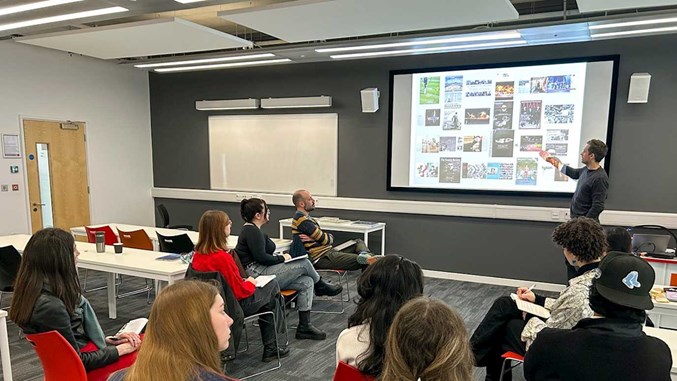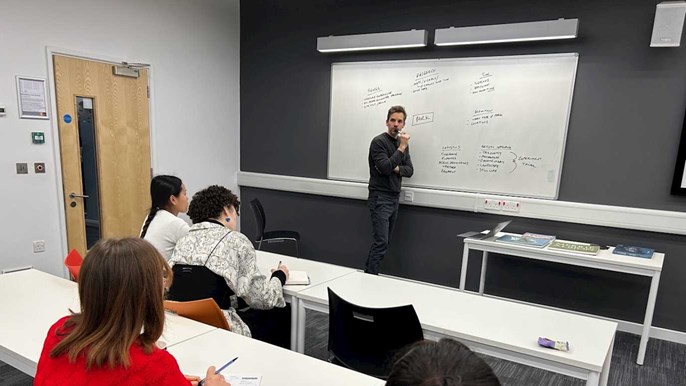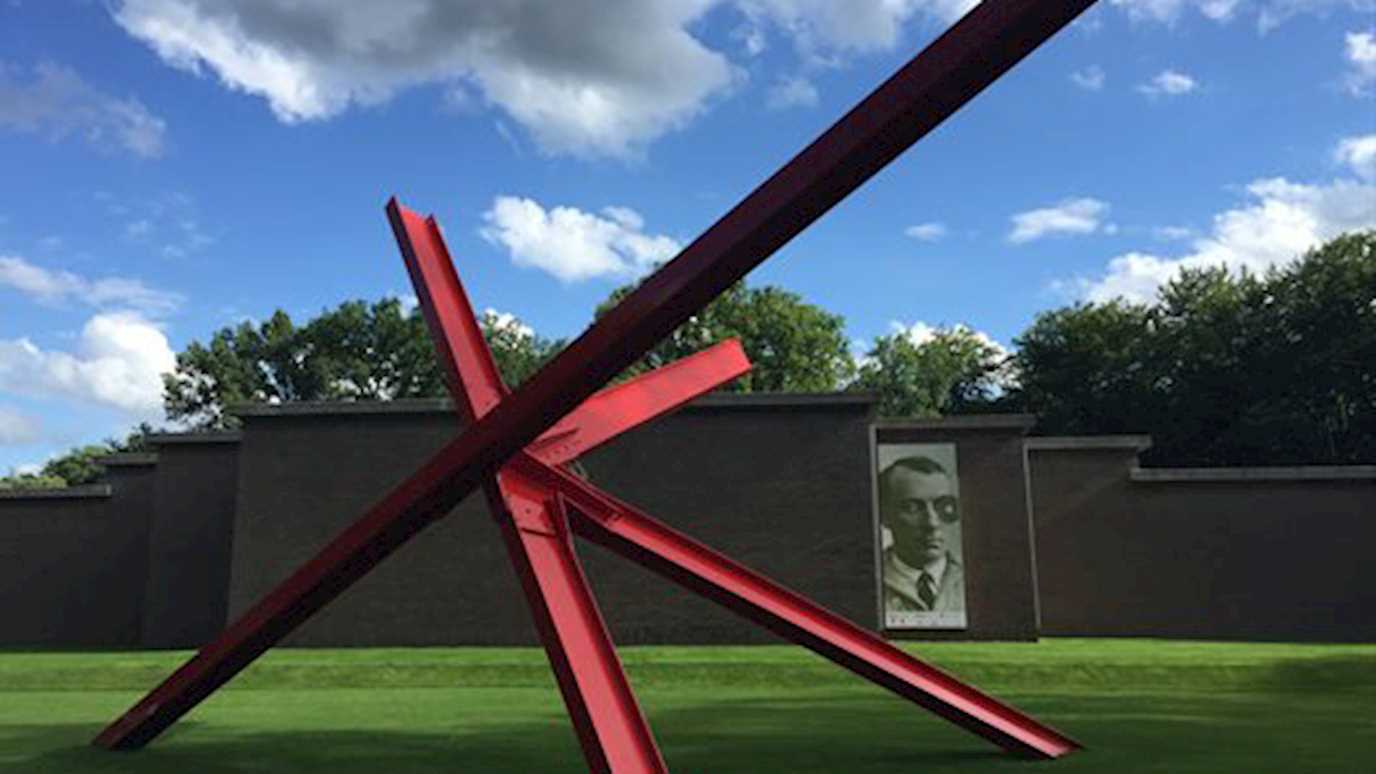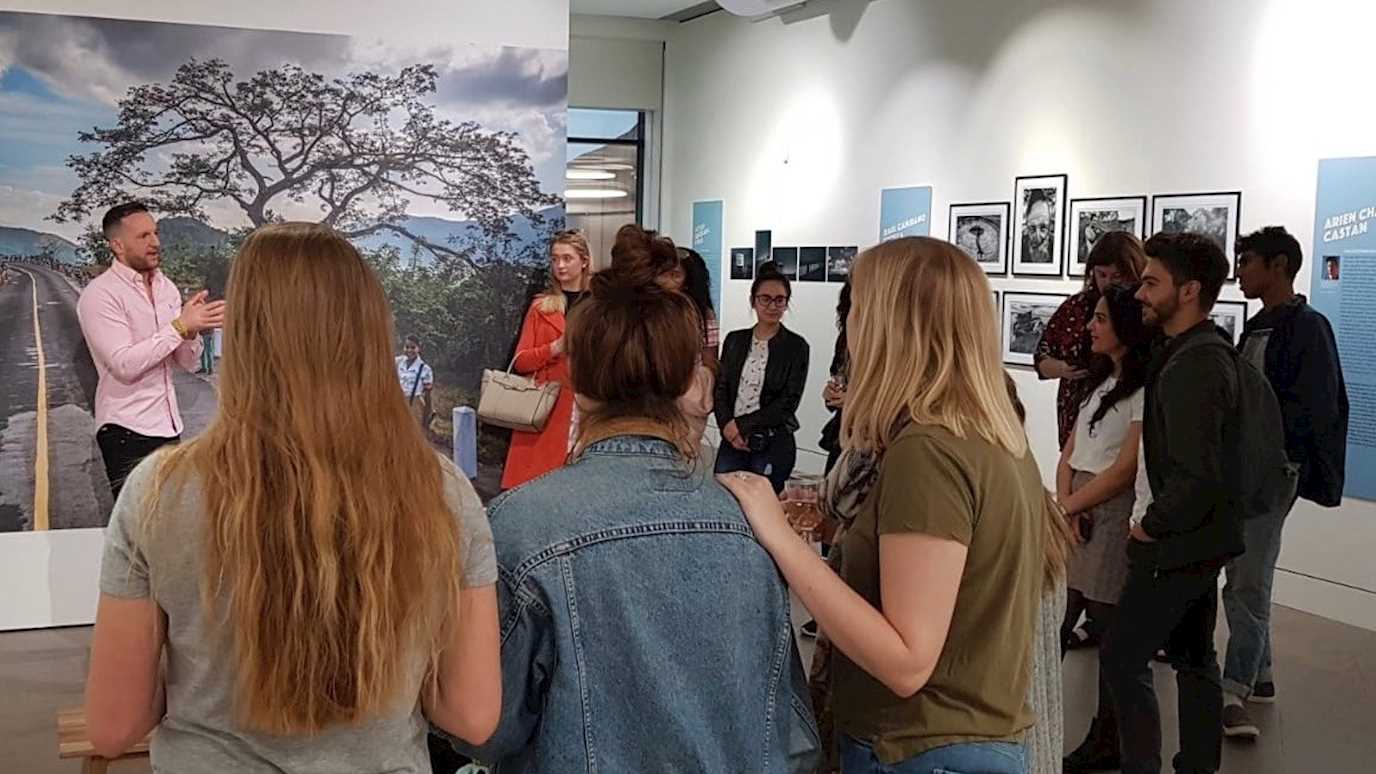In March 2023, photographer Simon Roberts visited Royal Holloway to provide a workshop for UG and PG students in order to develop their creative practice. Chiara Bordignon here details the events of this successful and thought-provoking event.

Simon Roberts talking to participants during his workshop at Royal Holloway, University of London
‘Tell your own story, and you will be interesting.’ – Louise Bourgeois
These are the words that Simon Roberts shared at the end of his practical workshop, organised by Dr James Kent with support from the Centre for Visual Cultures and the Department of Languages, Literatures & Cultures at Royal Holloway, University of London.
Simon Roberts is a visual artist based in Brighton, UK. He's recognised for his tableaux, large-format photographs of the British landscape, and has exhibited widely. His photographs reside in major public and private collections, including the Victoria & Albert Museum.
His workshop took participants on a journey through his career, from his studies in cultural geography to his interest in landscapes – covering everything from developing ideas to delivering a final project! One of the most interesting aspects of the workshop was that it brought together not only undergraduates and postgraduate students interested in developing their creative practice, but also alumni and staff.
Personally, I was struck by his passion for the subjects he has explored throughout his career, during which his personal life and creative practice have become intertwined. For instance, he talked us through his travels around Russia with his pregnant, Russian-speaking wife, and then later explained how he journeyed across England with his wife (pregnant again) and their young child.
Click here to see Simon's 'work in progress' printI was fascinated by the variety of themes and ideas Simon explored during the workshop, but was perhaps most stimulated by how he tied them together using the leitmotiv of his creative practice, exploring landscapes (as a place where personal stories are told), imagination, economy, politics, society, and making meaning.
In relation to developing our own creative practice and projects, he encouraged us to think about the question: “What is it that you want to say?” This question resonated with me long after the workshop ended, and while writing this blogpost. I thought to myself: “How am I personally contributing to the world, sharing perspectives and experiences in different ways?”
Perhaps, if we free ourselves from the fear of being judged for the way we are and esteem ourselves, then we can believe that we can contribute distinctively to the world and the lives of others. Indeed, Simon shared with us another important point: how can works be taken to the public to create a dialogue? How can the ideas be communicated and shared? And he pointed out that what you make of the work is as important as how you make it. It becomes then not an exercise in developing and using one own’s skills, but a talent you can share with others.
Towards the end of the workshop, Simon said: ‘You will be successful, and you will be rejected’, revealing that he still frequently doesn’t hear back from photo editors! We were reminded not to take rejection too personally. This is an area where I feel I have much to learn – particularly about not assimilating mistakes and rejections to my own personal development and achievements.
Most importantly, the workshop was not just a reflection on how to initiative ideas and how to be uniquely creative, but also an opportunity to explore how to plan a project: indeed – dreams are important but if you’re able to turn them into reality!

Simon Roberts runs a practical session about developing a project using the word “park” during his workshop at Royal Holloway, University of London
In the final part of the session, Simon gave us the task of developing a project using the word “park”. We thought about questions like: Can such a simple word be the starting point for a creative project? How do you define the term? How do you research around it? Which artistic approach do you want to use? What are the logistics of the project in terms of access, finances and permissions? How about special themes that narrow the topic or some more abstract ideas that lie behind it?
Think about a park: the landscape is what it is, but how would you communicate your own ideas, messages, and feelings about that place? It felt like a good starting point for exploring new ideas and projects! Other participants agreed and described how they found the workshop “inspiring”, “motivating” and an “amazing opportunity” for thinking about developing their own creative practice!
























